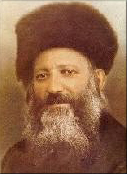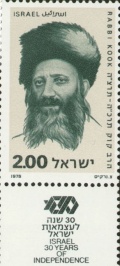Abraham Isaac Kook
Abraham Isaac Kook (1864 - 1935) was the first Ashkenazi chief rabbi of the British Mandate for Palestine, the founder of the (now) Religious Zionist Yeshiva Merkaz HaRav, and a renowned Torah scholar. He is known in Hebrew as הרב אברהם יצחק הכהן קוק HaRav Avraham Yitzchak HaCohen Kook, and by the acronym HaRaAYaH or simply as "HaRav."
Contents
View on Noahides
- Main article Judaism and Other Religions
Rav Abraham Isaac Kook was the first Ashkenazi chief rabbi of the Zionist return to the land of Israel. His writings embrace modernism by offering a vision of the restored land of Israel, at once evolutionary and Hegelian while at the same time mystical and messianic. His influence is widespread and influential as a Zionist dream of renewal of religious Judaism.
- As for other religions, in my opinion, it is not the goal of Israel's light to uproot or destroy them, just as we do not aim for the general destruction of the world and all its nations, but rather their correction and elevation, the removal of dross. Then, of themselves, they shall join the Source of Israel, from whence a dew of light will flow over them. "And I will take away the blood from his mouth and his detestable things from between his teeth, and he, too, shall remain for our God." (Zechariah 9:7) This applies even to idolatry -- all the more so to those religions that are partially based upon the light of Israel's Torah. (Iggrot ha-Rayah 112)
- It is necessary to study all the wisdoms in the world, all ways of life, all different cultures, along with the ethical systems and religions of all nations and languages, so that, with greatness of soul, one will know how to purify them all. (Arpelei Tohar 33)
Rav Kook acknowledges that other nations have other religions, and that many of them are based on the Torah. He obviously does not mean Torah in the narrow sense, but recognition that religions bring God's presence into the world. Their existence is not an obstacle to messianic times, but rather a challenge: It is part of the Jewish messianic task to “elevate” and “purify” the religions along with the entire world. The precise meaning and method of purifying the other religions is left unanswered, shrouded behind the vision of renewal.
Rav Kook does not seem to assign special historical significance to Christianity and Islam for their status as “branches.” In a move that accepts the already-globalizing situation of the early 20th century, even the non-Abrahamic religions contain gold and holiness, which await elevation and unity with the Source of Israel. One can encounter and empirically study them. Yet, it is a Jewish task to purify these other religions. The actual process, however, of study, purification, and unification is left frustratingly vague. Nevertheless, what is clear, though, is that, personally, Rav Kook was able to look at other religions – and even atheism – and see the Truth of Torah within them.
Biography
Abraham Isaac Kook was born in Griva, Latvia (a suburb of Daugavpils, then Imperial Russia) in 1865, the oldest of eight children. His father, Rabbi Shlomo Zalman Ha-Cohen Kook, was a student of the Volozhin Yeshiva, the "mother of the Lithuanian yeshivas", whereas his maternal grandfather was a member of the Kapust dynasty of the Hassidic movement.
As a child he gained a reputation of being an ilui (prodigy). He entered the Volozhin yeshiva in 1884 at the age of 18, where he became close to the rosh yeshiva, Rabbi Naftali Zvi Yehuda Berlin (the Netziv). Although he stayed at the yeshiva for only a year and a half, the Netziv has been quoted as saying that if the Volozhin Yeshiva had been founded just to educate Rav Kook, it would have been worthwhile. During his time in the yeshiva, he studied about 18 hours a day.
In 1886, he married Batsheva, the daughter of Rabbi Eliyahu David Rabinowitz-Teomim, (also known as the Aderet), the rabbi of Ponevezh (today's Paneve.z(ys, Lithuania) and later Chief Rabbi of Jerusalem. In 1887, at the age of 23, Kook entered his first rabbinical position as rabbi of Zaumel, Lithuania. In 1888, his wife died, and his father-in-law convinced him to marry her cousin, Raize-Rivka, the daughter of the Aderet's twin brother. In 1895 Kook became the rabbi of Bausk (now Bauska). Between 1901 and 1904, he published three articles which anticipate the fully-developed philosophy which he developed in the Land of Israel. During these years he wrote a number of works, most published posthumously, most notably a lengthy commentary on the Aggadot of Tractates Berakhot and Shabbat, titled 'Eyn Ayah' and a brief but powerful book on morality and spirituality, titled 'Mussar Avikhah'.
In 1904, Kook moved to Ottoman Palestine to assume the rabbinical post in Jaffa, which also included responsibility for the new secular Zionist agricultural settlements nearby. His influence on people in different walks of life was already noticeable, as he engaged in kiruv ("Jewish outreach"), thereby creating a greater role for Torah and Halakha into the life of the city and the settlements.
The outbreak of the First World War caught him in Europe, and he was forced to remain in London and Switzerland for the remainder of the war. While there, he was involved in the activities which led to the Balfour Declaration, 1917. Upon returning, he was appointed the Rabbi of Jerusalem, and soon after, as first Chief Rabbi in 1921. Kook founded a yeshiva, Mercaz HaRav Kook (popularly known as "Mercaz haRav"), in Jerusalem in 1924. He was a master of Halakha in the strictest sense, while at the same time possessing an unusual openness to new ideas. This drew many religious and nonreligious people to him, but also led to widespread misunderstanding of his ideas. He wrote prolifically on both Halakha and Jewish thought, and his books and personality continued to influence many even after his death in Jerusalem in 1935.
Kook built bridges of communication and political alliances between the various Jewish sectors, including the secular Zionist leadership, the Religious Zionists, and more traditional non-Zionist Orthodox Jews. He believed that the modern movement to re-establish Israel as a state had profound theological significance. Per this ideology, the youthful, secular and even anti-religious Labor Zionist pioneers halutzim were a part of a grand divine scheme whereby the land and people of Israel were finally being redeemed from the 2,000 year exile (galut) by all manner of Jews who sacrificed themselves for the cause of building up the physical land, as laying the groundwork for the ultimate spiritual messianic redemption of world Jewry. He once commented that the establishment of the Chief Rabbinate was the first step towards the re-establishment of th ... \n
Authors Nominate Top Books of All Time
In 2002, the Norwegian Book Clubs gathered 100 authors from 54 countries and asked each one to list the 10 best works of fiction of all time. The authors responded and this list was created. The titles are arranged alphabetically by author name, so no one book stands above any other. The following list is the groups selection of the worlds 100 best books.How many have you read?
[Authors Nominate Top Books of All Time]
[GoodvilleNews.com - good, positive news, inspirational stories, articles]
Celebrity Chef Chris Nirschel Cooks for the Homeless
Cause Celeb highlights a celebritys work on behalf of a specific cause. This week, Chris Nirschel shares with us, via email interview, his work with The Food Bank for New York City.After 28 years, The Food Bank for New York has become the citys major hunger relief organization and one of the largest food banks in the country.
[Celebrity Chef Chris Nirschel Cooks for the Homeless]
[GoodvilleNews.com - good, positive news, inspirational stories, articles]
Daughter Saves Father by Lifting Car Off Him
A fast acting 22-year-old has been hailed a hero after she lifted up a car weighing a ton and a half to save her father, who became crushed under his BMW 525i.
[Daughter Saves Father by Lifting Car Off Him]
[GoodvilleNews.com - good, positive news, inspirational stories, articles]
Why You Should Always Trust Yourself
Trust yourself. You know more than you think you do. Benjamin SpockAs time passes by and the more work you will do on discovering and improving yourself, the more you will realize that the ancient Latin quotation: Ne te quaesiveris extra - Do not look outside of yourself for the truth, is true.
[Why You Should Always Trust Yourself]
[GoodvilleNews.com - good, positive news, inspirational stories, articles]
7 Ways to Deal With the Death of a Loved One
How do you deal with death, the loss of a loved one when the pain is so strong; how can you let go of the people you once loved and still love so much; how can you accept the fact that you will never see those people ever again? How can you accept the idea of loss, of death?
[7 Ways to Deal With the Death of a Loved One]
[GoodvilleNews.com - good, positive news, inspirational stories, articles]

